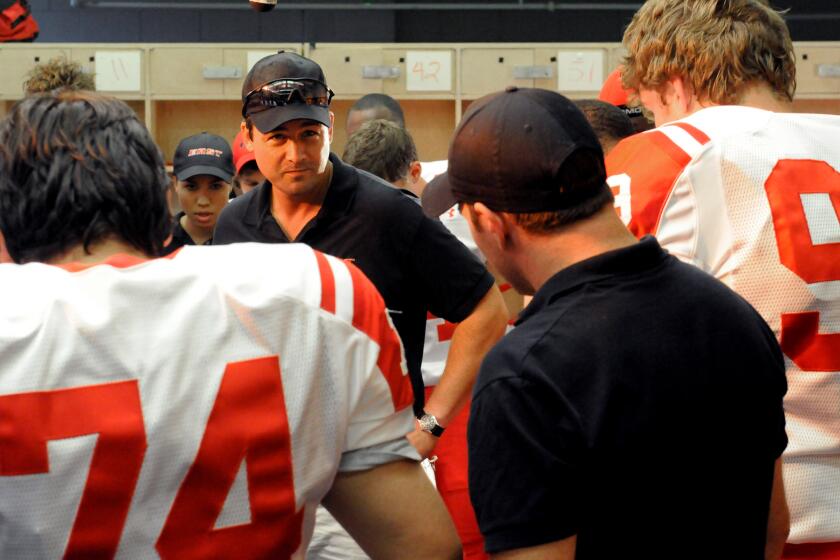William S. Paley Planted Seeds of CBS’ Collapse : Television: Like a parent who could not let go of his child, the possessiveness of the network’s founder almost destroyed the thing he loved most.
Are they writing the will at CBS?
It sounded like it this week when the last-place network finally came clean in a dramatic move, issuing a document with all kinds of admissions about its desperate condition.
While viewers think of CBS as “Murder, She Wrote” and “Murphy Brown,” cold, funereal words from top management gave a different picture of the house that Lucy built:
“There can be no assurances that the company’s anticipated future losses from network operations will not exceed current expectations.”
Nor, said CBS, can there be assurances that “the company will be successful in its attempts to reduce its costs or improve its productivity.”
Throwing in the towel? What kind of talk is this from the network that gave us “I Love Lucy,” “All in the Family,” “The Honeymooners” and “Mary Tyler Moore”? Where’s the fun of yesteryear?
What fun? This is 1990, and after a series of bad decisions--including huge overpayment for TV rights to baseball for four years--CBS agrees that there’s no business like show business when it comes to risky business.
CBS disclosed its worries through the announcement of a $2-billion buyback of its own stock from shareholders. To many observers, CBS, rather than expanding by investing in other media properties like competitors ABC and NBC, was padding its pockets--and possibly setting itself up to be sold or merged.
And yet . . . and yet . . . a small ray of hope gleamed in CBS’ buyback announcement. It said:
“The company is committed to providing the viewing public with the most appealing television programming possible in order to improve its national ratings and thereby generate increased advertising sales.”
Was this a prayer? Was it a sop to the cynical who think that CBS Chairman Laurence Tisch really wants to flee the TV business, in which he has little background (he’ll make an estimated $157 million on the shares he sells back to CBS)?
Or was that brief sentence about “appealing television programming”--a subject that’s been lost in all the talk about billions--a last-chance order to CBS Entertainment President Jeff Sagansky telling him that he, and he alone, can save the network that once ruled all of TV as the world’s leading advertising outlet?
That would be cruelly unfair pressure on Sagansky, especially if CBS is really on the prowl for a quick buyer like Disney, because prime-time revival is usually a long-term process. With little on the shelf when he took over, Sagansky has done a creditable job thus far.
But the miracle of TV--something that even a show-business outsider like Tisch can grasp--is that two or three major hits can turn a network around completely. Witness NBC’s “The Cosby Show” and “Cheers” and ABC’s “Roseanne.”
Thus the ultimate question if Sagansky can’t pull off a miracle on short notice:
Whither CBS?
Many hope the network will be sold to a major entertainment company that would give CBS and its dedicated employees a chance to flourish again. It is, after all, still one of America’s Big Three networks and could well be revived through the showmanship and support of the right owner.
Tisch expressed support in the past for such worthy series as “Tour of Duty” and “Beauty and the Beast.” And CBS, even in its current crisis, has pledged--at least publicly--that the one area in which it won’t cut back is programming.
But Tisch’s sale of CBS Records, his cutbacks in the news division and his publicly stated view that TV is like any other business have turned America’s most glamorous network into a dour corporate entity, a shadow of its former self.
It looks, in short, ripe for the picking, despite Tisch’s denial this week that he’ll sell CBS. The onetime “Tiffany network” has seemed like a fire-sale house for the last few years.
And it is mind-boggling that CBS, which is now down to owning only four stations--fewer than ABC and NBC--has expressed no intention of buying others, even though they are generally huge moneymakers and support their parent companies.
If you remember and admire what CBS stood for--from Edward R. Murrow to Walter Cronkite and “Playhouse 90”--you can sense the enormity of the tragedy in this collapse of a notable and grand institution.
But you can’t pin the blame on Tisch and let it go at that. The seeds for the collapse, and the opportunity for today’s management to take over, were planted by the late, legendary patriarch of CBS, William Paley, whose capricious hirings and firings of his supposed successors prevented the network from establishing a sound and continuous new management that would carry on.
Like a parent who could not let go of his child, his possessiveness eventually ruptured the relationship, and, inevitably, he was partly to blame for almost destroying the thing he loved most, the network that he built.
Now history takes its toll. To many, the master builder of CBS was the network’s longtime president, Frank Stanton, from whom Paley cruelly withheld the title of chief executive officer. He forced out the devoted Stanton and even invoked a clearly flexible age rule that made him retire from the CBS board of directors.
Paley later re-established a relationship with Stanton. But imagine if Stanton, a corporate architect of extraordinary ability and principles, had been able to continue in a formal capacity for the remainder of his productive years, perhaps laying out and administering a master plan for the network that he also loved.
What goes around comes around. The CBS corporate cadre that once flourished under the gleaming charm and showmanship of Paley has become dangerously inept under Tisch in costly financial matters like the TV sports rights debacle.
And in a grand irony, the last best hope of CBS is right here in Hollywood, land of profligate spenders and creative wastrels--the kind of people Paley liked--where Sagansky and his troops are trying to pull the network through. It is CBS Entertainment, not the bookkeepers, that will determine whether viewers turn the network around.
For four nights, starting Jan. 20, Sagansky will try to rekindle some magic with a rerun of CBS’ hugely successful Western miniseries, “Lonesome Dove,” hoping it propels the network into the February ratings sweeps. But what Sagansky needs most is time.
In an era where viewers can choose from scores of television channels, CBS badly needs to rebuild an image. It has none now. And you can’t buy one on the stock market.
More to Read
The biggest entertainment stories
Get our big stories about Hollywood, film, television, music, arts, culture and more right in your inbox as soon as they publish.
You may occasionally receive promotional content from the Los Angeles Times.






